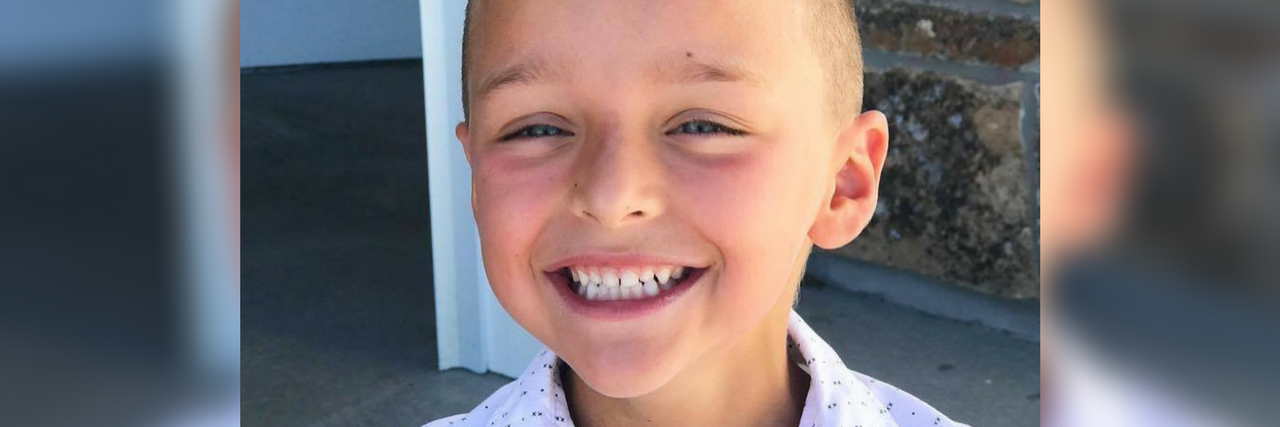When a child complains of aches and pains but has no apparent injuries or health issues, their concerns may be chalked up to “growing pains,” with the expectation that the pain will soon fade. For some kids, that is exactly what happens. But for others, the aches and pains experienced during childhood turn out to be a sign of a serious health condition.
The latter was the case for 6-year-old Nixon Whatcott of Utah. In an essay shared with Love What Matters, Nixon’s mother Janessa explains that she initially assumed her son’s leg pain was simply “growing pains.”
My 6-year-old son Nixon had been complaining of leg pain for the last few weeks, and we had been doing everything we knew to help his growing pains. He is just like his older brothers, Drew, who is 11, and Hudson, who is 8. They are always playing sports and Nixon could be found at recess either playing soccer or football. He was just finishing up basketball and baseball season and after weeks of putting it off as growing pains, my husband Nick and I decided to take him in.
We were able to get an appointment in the late afternoon right as were planning to leave town. I was running behind on packing and Nixon hadn’t complained about his leg hurting that day and had been playing outside. While we were waiting in the waiting room, I mentioned to a friend who was also there that I was paying $25 to have the doctor tell me that it was growing pains. As it always seems to go, you bring your child in sick, and they end up having a cold. You think they have a cold and wait to take them to the doctor, and they end up having strep.
An X-ray of Nixon’s leg revealed that there was a large tumor growing on his femur. His parents then brought him to the oncology department of Primary Children’s Hospital for additional testing. There, the family found out Nixon’s tumor was, in fact, malignant. “Nick and I were devastated to say the least,” writes Janessa. “Our beautiful, perfect son had cancer and the future was full of unknowns.”
Nixon’s story may sound familiar to anyone whose childhood symptoms were dismissed as “growing pains.”
For those in the chronic illness community, it can take many years (sometimes decades) for your illness or pain condition to be diagnosed. Even if you didn’t get a name for your symptoms until adulthood, many people can trace their pain back to early childhood, but had their complaints ignored or dismissed.
In her essay “What I Wish I’d Known When a Nurse Said My Aches and Pains Were ‘Normal,’” Alexandra Kaye explains how her early complaints about pain were shrugged off by doctors and nurses:
“I was 8 and in the third grade… I don’t know what question [the nurse] asked me to prompt this response or if it was just me trying to talk to her… but I remember talking about pain. I remember saying something like, ‘My X hurts and my Y hurts and sometimes my Z hurts, too,’ and she looked at me and said, ‘Honey, everybody gets aches and pains; that’s normal.’
And that is the phrase I have quite literally clung to as comfort for the past 12 years of my life.”
It’s all too easy for a child’s health issues to be overlooked by doctors or family members if the symptoms are not super apparent. This certainly doesn’t necessarily indicate malice or neglect; it can simply be difficult for a young child to communicate effectively and advocate for themselves. Plus, children experiencing aches and pains may not be old enough to recognize when their symptoms are not “normal,” especially if they grew up with it and that’s all they know.
In Kaye’s case, being told that her pain as a child was “normal” led her to believe all the pain and symptoms she continued to experience for the next decade were normal. It wasn’t until many years later that she was diagnosed with a rare disease called Ehlers-Danlos syndrome. “I wonder what my life would have been like had I not held onto that one phrase,” Kaye writes. “Maybe I could have gotten help, diagnoses and treatment sooner so I wouldn’t have progressed this far in my Ehlers-Danlos syndrome (EDS).”
Although most children who experience pain growing up likely do not have cancer or an immediately life-threatening condition, these stories are a reminder that we need to take children’s complaints seriously. It may be growing pains, it may be cancer, it may be an early sign of a chronic illness or chronic pain condition. Whatever the cause of their symptoms turns out to be, children deserve to be listened to and receive appropriate medical attention.
For anyone struggling to have their pain taken seriously, Kaye offers the following advice:
“At the end of the day, just remember you’re not imagining this and you’re not alone. This is real, and it’s happening to you, and there are some things that can be done to help prevent progression, so fight for yourself. Don’t be placated by people telling you it’s normal to have aches and pains, or that you should just push through the pain, or you should stop being so lazy and stop seeking attention. Those things are not the reality of your situation and as invalidating as it is for you to hear that, you have to not believe it… It’s real and there’s a whole community of people out there who will believe and understand you.”
You can follow Nixon’s journey on his Facebook page, NixonStrong.
Image Credit: NixonStrong Facebook page

